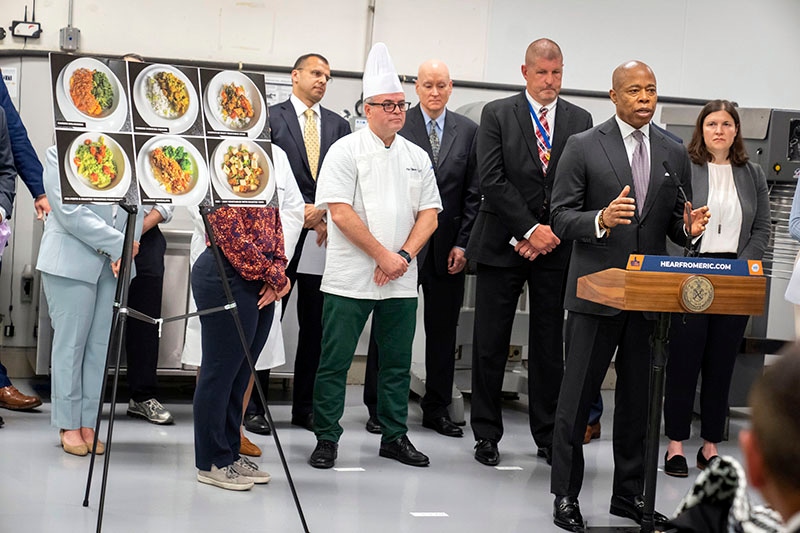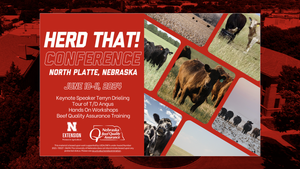Vegan NYC mayor commits to food-based emissions reduction
Mayor calls out meat and dairy as city commits to 33% reduction in absolute carbon emissions.

New York City Mayor Eric Adams, a self-proclaimed vegan, and Chief Climate Officer and New York City Department of Environmental Protection (DEP) Commissioner Rohit Aggarwala released this week the city's first integrated greenhouse gas inventory, which incorporates emissions from the production and consumption of food. Those emissions represent 20% of New York City's overall emissions — the third largest source, behind buildings (35%) and transportation (21%). The inventory — developed by the Mayor’s Office of Climate & Environmental Justice (MOCEJ) — includes emissions involved in the production of goods and services New Yorkers consume, whether or not that production occurs in New York City. In response to the new inventory, Mayor Adams and Mayor’s Office of Food Policy (MOFP) Executive Director Kate MacKenzie also announced that the city will reduce absolute carbon emissions from food purchases across its city agencies by 33% by 2030.
“The new integrated emission inventory we're unveiling today show that food is the third-biggest source of cities’ emissions right after buildings and transportation. Third, right after buildings and transportation. One in every five metric tons of carbon dioxide our city emits comes from food. But all food is not created equal. The vast majority of food that is contributing to our emission crises lies in meat and dairy products,” Mayor Adams stated. “We already know that a plant-powered diet is better for your physical and mental health, and I am living proof of that. But the reality is that thanks to this new inventory, we're finding out it is better for the planet.”
Adams said the concept is “going to be an uncomfortable moment for many,” but called it a significant for the city.
“It is easy to talk about emissions that are coming from vehicles and how it impacts our carbon footprint. It is easy to talk about the emissions that's coming from buildings and how it impacts our environment, but we now have to talk about beef. And I don't know if people are really ready for this conversation,” he said.
Deputy Mayor for Health and Human Services Anne Williams-Isom said NYC Health + Hospitals is on track to serve more than three-quarters of a million plant-based meals over this calendar year. New York City public schools have also already implemented meatless programs. Meatless Mondays went into effect in 2019/20, and in early 2022, Plant-Powered Fridays were introduced.
“The relationship between what we eat and its effect on climate change and the environment is known,” said MOCEJ Executive Director Kizzy Charles-Guzman. “In working to combat the climate crisis we’ve faced, for too long, we’ve looked only to the cars we drive and the buildings in which we live, with too little attention paid to what’s right in front of us: The food on our plates.”
New York City has measured citywide emissions since 2005, but this is the first time the city has included emissions from household consumption. These emissions were modeled by EcoDataLab as part of an ongoing project coordinated by C40 that is working with cities to identify urban consumption indicators for data-driven climate action and measurement. The new inventory showed that 20% of New York City’s greenhouse gas emissions come from household food consumption of items such as meats, poultry, fish, eggs, and dairy products. It suggests that the city’s emissions can be reduced by eating more low-carbon food, including fruits, vegetables, grains, and legumes.
In 2022, Mayor Adams announced that the city had signed onto the “C40 Good Food Cities Declaration” — joining London and 13 other cities around the world delivering on the same pledge — to increase access to plant-forward and nutritious food for city residents and halve their city’s respective food waste. C40 is a network of nearly 100 mayors from the world’s leading cities working to deliver urgent, local action to confront the climate crisis and create a future where everyone can thrive.
Mayor Adams also launched the Plant-Powered Carbon Challenge, urging private, institutional, and nonprofit sector leaders to reduce their food-based emissions by 25% by 2030. MOFP — in partnership with the companies Coolfood and Greener by Default — will support participants in measuring and reducing the carbon footprint of their existing procurement practices. These commitments will be formalized in Mayor Adams’ strategic climate plan to be released later in April.
In a statement to Feedstuffs, NCBA Vice President of Government Affairs Ethan Lane said: “It’s easy for Mayor Adams to lob attacks at beef that will make for better headlines than ‘Meet NYC’s Rat Czar,’ but the reality is that greenhouse gas emissions from beef cattle represent only 2% of emissions in the United States. In fact, all of agriculture accounts for approximately 11% of U.S. emissions and that includes everything in the mayor’s vegan diet. Cattle producers are continuously improving their sustainability practices and will keep producing high quality beef to feed the entire world, while only contributing a small fraction in U.S. emissions. Mayor Adams will get some media coverage by besmirching beef’s good name, but we hope the next time he quotes the correct information.”
About the Author(s)
You May Also Like





